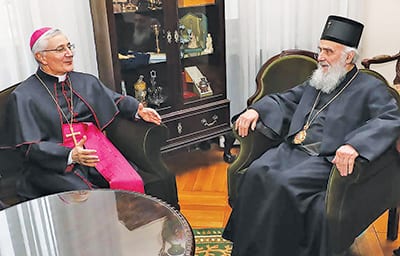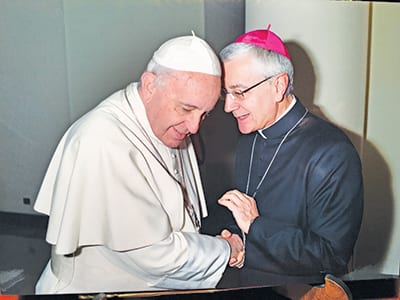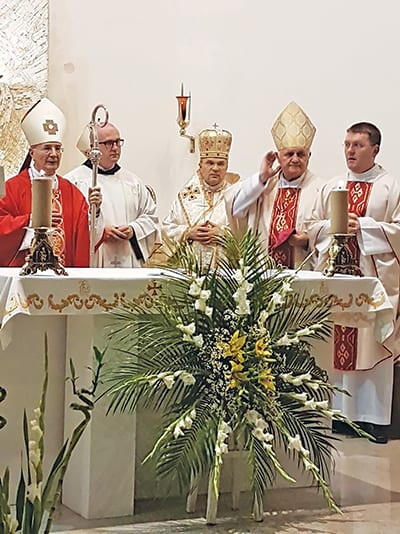Members (of the Mixed Commission) acknowledged that the shared review of Cardinal Stepinac’s life was a positive experience and that the meetings took place in a climate of cordiality and free exchange. The work accomplished in those months allowed for a better knowledge of the historical period extending from the Second World War to the death of the Cardinal in 1960.
Appreciation was expressed for what the Cardinal accomplished, amid countless difficulties, even if – as we read in the above joint communiqué – the various events, speeches, writings, silences and positions were taken by Cardinal Stepinac remain the object of divergent interpretations.
The head of the Roman Catholic Church, Pope Francis, accepted the invitation of Tomislav Nikolić to visit Serbia. In order for this visit to be realised, the invitation should be renewed by new President Aleksandar Vučić, but an agreement should also be reached with the Serbian Orthodox Church – says Archbishop Luciano Suriani, Apostolic Nuncio in Serbia, in this interview for CorD Magazine.

In a conversation that included discussion of the Vatican’s stance regarding Kosovo and its relationship towards cultural and religious heritage sites, Archbishop Suriani also recalls the fact that Pope Francis has made ecumenical and interreligious dialogue one of the primary commitments of his papacy. In this spirit, CorD’s interlocutor also mentions his mission whilst in Serbia to “accelerate communication between the Vatican and Belgrade”, despite the challenges – one of the greatest of which is also the issue of the canonisation of Cardinal Aloysius Stepinac.
Following the lead of my predecessor, Archbishop Orlando Antonini, I have tried from the outset to deepen the cordial and constructive relations that already exist with the civil and religious authorities, and in a special way with His Holiness Patriarch Irinej. I think I can say that, in matters of common interest, there is a good spirit of cooperation with representatives of the government and with those of the Serbian Orthodox Church.
What do you consider the greatest challenges in relations between the Holy See and Serbia?
– As Pope Francis’ representative in Serbia, I would consider it one of my priorities to remain close to the Catholic communities in the country, and in a special way to their pastors. Quite often, these are small communities needing support in upholding their rights and help in living their faith in dignity and freedom.
There is also our commitment to building genuine and fraternal relationships with our brother bishops of the Serbian Orthodox Church, and to seeking out and travelling together along paths of communion towards the unity that Jesus implored from the Father.
The Holy See also follows with interest Serbia’s relations with other European countries, particularly its closest neighbours, and strives to contribute, at both the bilateral and the multilateral levels, to a steady, honest and open dialogue as the privileged way of resolving tensions and promoting cooperation and peace between nations.
The different bishops whom I have had the pleasure of meeting, some on a number of occasions, have never given me the impression of being opposed to a possible visit of Pope Francis to Serbia
Bilateral relations are also viewed in the public through the question of the possible visit of Pope Francis to Serbia. An invitation was allegedly sent twice by former President Tomislav Nikolić. Is there a willingness in the Vatican to make this visit happen?
– Pope Francis willingly accepted the invitation that former President Tomislav Nikolić extended to him at the time of their meeting in September 2015, and wishes to visit Serbia. In the meantime, the country has a new President in the person of His Excellency Aleksandar Vučić, who, I imagine, would want to renew the invitation. So I think that I can confirm that willingness is there, but it will be necessary to find, by common agreement, the times and means to make it happen.
The invitation for Pope Francis to visit Serbia was sent with one proviso: that the Serbian Orthodox Church also needs to express its position. Given that since your first day in Serbia you have been in contact with the Serbian Orthodox Church, do you believe that their opposi¬tion to date can be overcome?
– As is always the case with papal visits to countries having an Orthodox majority, for the visit to take place, the Pope wants the local religious authorities to be in agreement, or at least not opposed. In this particular case, as you know, the Apostolic Nuncio does not take part in meetings of the bishops of the Serbian Orthodox Church, so I am not in a position to know the reason for the opposition to which you referred. But I can add that the different bishops whom I have had the pleasure of meeting, some on a number of occasions, have never given me the impression of being opposed to a possible visit of Pope Francis to Serbia.
Is there a greater chance for Pope Francis to visit Pristina, which the local government has stressed numerous times as one of their great wishes?
– If the desired visit to Serbia by Pope Francis were to take place, it would be of a primarily pastoral nature, as has always been the case for his other visits and those of his predecessors. In that case, then, I believe it would not be out of place for him to visit the Catholic communities present in the neighbouring regions, in order to confirm them in their faith in Jesus Christ and to strengthen their communion with the Successor of Peter and with the entire Church.
On numerous occasions, we have heard announcements from Pristina that it is only “a mat¬ter of timing” when the Vatican will recognise Kosovo’s independence. Is that true?
– The Holy See’s position on the question of Kosovo is well known, and here I refer to well-founded and official information. Beyond this, due to the delicate nature of the problem, I want to state clearly that I appreciate and encourage the efforts and the commitment of all those who, on the local and international levels, are seeking a mutually acceptable and peaceful solution, for the good of all.
The Holy See is represented at UNESCO by a Permanent Mission: in that context, the Holy See willingly cooperates in seeking the best solutions to preserve and promote the cultural and Christian heritage present in Kosovo
How do you look at the problem of protecting cultural and Christian heritage in Kosovo? How does the thesis of the “Kosovar heritage” sound to you, which aims to link this heritage to the territory upon which it is located and not necessarily to the nation and religion through which it originated?
– If a cultural treasure is really such and, as in this case, also involves the religious identity of a community, it is a value that must be preserved and protected, since it is a treasure for all humanity. In a particular way, it is a treasure for future generations, for it is a part of history and history is the teacher of life.
For that matter, as is well known, the Holy See is represented at UNESCO by a Permanent Mission: in that context, the Holy See willingly cooperates in seeking the best solutions to preserve and promote the cultural and Christian heritage present in Kosovo.
More generally, churches and monasteries everywhere should not be seen only as “cultural treasures” needing to be preserved materially, but also with due respect for the conditions that enable Christian communities to practice their faith freely in those centres.
Pope Francis is an advocate of strengthening ties between the Catholic and Orthodox Churches, which he has also written about in his letters, one of which was quoted in particu¬lar in Serbia, addressed to Ecumenical Patriarch Bartholomew, with whom he jointly signed the Declaration on the Unification of Christians two years ago. Ecumenical dialogue has both its advocates and opponents in the Serbian Church. What have your experiences been like to date on this issue?
– Sadly, it must be acknowledged that for many centuries little dialogue existed between the Orthodox Church and the Catholic Church. On the other hand, it should also be pointed out that once our “ecumenical journey” began, albeit with small steps, we have travelled a good distance together.

Pope Francis, following in the line of his predecessors, has made ecumenical and interreligious dialogue one of the primary commitments of his papacy. We still have vivid memories of his embrace with Patriarch Kirill in Cuba, as well as his various meetings with Patriarch Bartholomew and with other Orthodox leaders. I believe that events like this cannot be overlooked; they are signposts along the way and an incentive for everyone to persevere, looking especially to the many things that unite us and not the few that set us apart.
So far, my experience here in Serbia has been positive, since I have always found, in the bishops, priests and laity I have met, an openness to honest and cordial dialogue. We are not living in easy times and in many countries Christians are the target of persecution and violence.
Pope Francis has often spoken of an “ecumenism of blood”, meaning that many of our brothers and sisters are being poorly treated and frequently killed, simply because they are Christians; those who persecute them do not care about their differences. I am convinced that nowadays most Christians want to make a greater effort to pursue paths of communion and to seek the way of unity in Jesus Christ.
A joint communiqué was issued, whose text can be found on the internet. In it, the members all acknowledged that the shared review of Cardinal Stepinac’s life was a positive experience and that the meetings took place in a climate of cordiality and free exchange
Another great challenge for relations between Serbia and the Vatican is the issue of the canonization of Cardinal Aloysius Stepinac. Serbian Patriarch Irinej asked in a letter to Pope Francis that this issue be “removed from the agenda”. How do you view that process?
– Pope Francis, accepting a proposal by Patriarch Irinej, established a Mixed Commission of experts, made up of both Serbian Orthodox and Croatian Catholics, for a joint historical re-evaluation of the figure of Cardinal Stepinac. He entrusted its organization to Father Bernard Ardura, the President of the Pontifical Committee for the Historical Sciences, a qualified person who is particularly suited to carry out that role by virtue of his training and the office he holds.
Dialogue, even when difficult and irksome, is always the best road to take. It is the best way to grow in mutual knowledge and to overcome truisms and prejudices that can turn into unsurmountable walls.

Dialogue helps build bridges and tear down walls. Your readers will know that Pope Francis, from the beginning, wanted the work of the Commission to take place in complete confidence, out of respect for its members and as a way of avoiding needless chatter and inappropriate comments that would have proved completely unhelpful for the Commission’s work.
On 13 July last, the final meeting was held in the Vatican. A joint communiqué was issued, whose text can be found on the internet. In it, the members all acknowledged that the shared review of Cardinal Stepinac’s life was a positive experience and that the meetings took place in a climate of cordiality and free exchange.
The work accomplished in those months allowed for a better knowledge of the historical period extending from the Second World War to the death of the Cardinal in 1960. Appreciation was expressed for what the Cardinal accomplished, amid countless difficulties, even if – as we read in the above joint communiqué – the various events, speeches, writings, silences and positions taken by Cardinal Stepinac remain the object of divergent interpretations.
This notwithstanding, Hence, the communiqué concludes that “the members of the Commission have agreed on the possibility of future collaboration in a common effort to share the memories of the martyrs and confessors of both Churches”. The pain, the sufferings and the death of so many of our brothers and sisters in the faith cannot fail to advance the fellowship we desire.
Turning to global challenges, how would you comment on the predictions of some geopo¬litical analysts that the world is threatened by another major “clash of civilisations”, and thus religions, primarily Christian and Islam?
– Sometimes analyses can risk giving a partial vision of reality. Yet it is also evident that humanity as a whole is living through a very difficult period. Pope Francis has often observed that we are in the midst of “a third world war being fought piecemeal”. Sadly, when all the outbreaks of war and all the battlefields are combined, we are indeed faced with a large-scale war that daily takes a high toll of mortalities.
I would not speak of a clash of civilisations, but instead acknowledge that it is becoming increasingly urgent for national leaders to seek new and realistic ways of eliminating all forms of injustice, so that peace, which is the fruit of justice, can once more reign among peoples. In all this, the religions are called by their very nature to be means of communion and not of division, as at times they can appear.
Next year we will celebrate the seventieth anniversary of the Universal Declaration of Human Rights. It would be sufficient if, from time to time, all of us, especially government leaders, were to reread it and try to apply it for the sake of a more just society and a better world
In some Eastern European countries, intolerance towards migrants is explained by al¬leged concerns about the preservation of a nation’s own identity. What do you think of such an approach?
– Every man and woman is a person, possessed of identity and a dignity that are universal. Next year we will celebrate the seventieth anniversary of the Universal Declaration of Human Rights. It would be sufficient if, from time to time, all of us, especially government leaders, were to reread it and try to apply it for the sake of a more just society and a better world.
International organizations are charged with disseminating and promoting the spirit embodied in the Declaration and implementing its contents. We all know that fear is a poor counsellor and never helps. What is needed is the courage to confront the phenomenon of migration in all its various facets.
The world has always experienced events of this kind. The competent authorities are called to work together in seeking solutions that benefit everyone, both individuals and society as a whole. The supreme good, to be preserved at any cost, is human lives, followed by the challenging task of seeking employment so that those who have left their homeland can lead a dignified life and contribute to the prosperity of the country that receives them. Naturally, too, for the sake of a correct integration, newcomers cannot consider themselves only as having rights, but also, like everyone else, duties as well.
In today’s world of great social stratification and global terrorism, how seriously do you think leaders understand Pope Francis’s call for the poor and refugees to be the top priority for world politics? This was also precisely what was said by the G20 leaders at their June meeting in Germany.
– I greatly hope that Pope Francis’s words were welcomed by the participants in the Hamburg G20 and prompted some reflection in the course of their discussions. The Pope has often said that he wants to be the voice of all who have no voice, in other words, the poor.
The leaders of these nations cannot claim not to see or recognise the importance of the problem of poverty, which today more than ever is evident in many guises and on many faces. Furthermore, it is not enough to make decisions if these are subsequently ignored and remain unimplemented.
Pope Francis ended his message to the participants in the G20 Summit by invoking God’s blessing “on the meeting and on every effort of the international community to shape a new era of development that is innovative, interconnected, sustainable, environmentally respectful and inclusive of all peoples and all individuals”.
I am profoundly convinced that all believers have the responsibility to accompany the commitment and the work of government leaders with their prayers and their own personal contributions. May universal fraternity be the goal to which all of us tend in confident hope, and not a mere utopia.